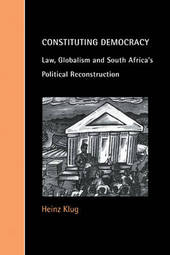
|
Constituting Democracy: Law, Globalism and South Africa's Political Reconstruction
Paperback / softback
Main Details
| Title |
Constituting Democracy: Law, Globalism and South Africa's Political Reconstruction
|
| Authors and Contributors |
By (author) Heinz Klug
|
| Series | Cambridge Studies in Law and Society |
|---|
| Physical Properties |
| Format:Paperback / softback | | Pages:284 | | Dimensions(mm): Height 229,Width 152 |
|
| ISBN/Barcode |
9780521786430
|
| Classifications | Dewey:320.968 |
|---|
| Audience | | Professional & Vocational | |
|---|
| Illustrations |
Worked examples or Exercises
|
|
Publishing Details |
| Publisher |
Cambridge University Press
|
| Imprint |
Cambridge University Press
|
| Publication Date |
11 September 2000 |
| Publication Country |
United Kingdom
|
Description
Against the backdrop of South Africa's transition from apartheid, this provocative book explores the role of late twentieth century constitutionalism in facilitating political change. Using South Africa as a case study, Klug's larger project is to investigate why there has been renewed faith in justiciable constitutions and democratic constitutionalism despite the widespread recognition that courts are institutionally weak, lack adequate resources and are largely inaccessible to most citizens. He places this question in a broader context, evaluating the appeal of different constitutional models and illustrating how globalized institutions can be adapted to serve local domestic needs. Incorporating constitutional law, politics and legal history, this examination of South Africa's constitution-making process provides important insights into the role of law in the transition to democracy.
Reviews'Constituting Democracy is essential reading for anyone who is interested in comparative constitutionalism, the politics of constitutional adjudication, and the role of the Constitutional Court in South Africa's democratic transition. It is an important attempt to rethink the relationship between democracy and constitutionalism, as well as between the global and the local. It is original, engaging, perceptive and well written.' Journal of Public Law
|